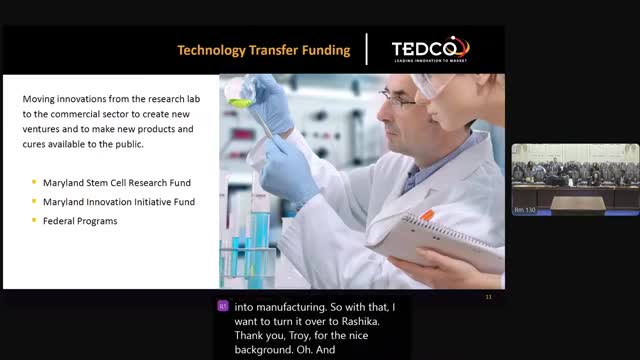Maryland Stem Cell Research Fund: TEDCO brief highlights clinical progress, economic returns and new manufacturing grants
Get AI-powered insights, summaries, and transcripts
Subscribe
Summary
At the Jan. 15 Ways and Means briefing, TEDCO representatives described the Maryland Stem Cell Research Fund’s clinical advances, claimed economic returns on state investments and a 2023 Manufacturing Assistance initiative to help stem-cell companies scale in Maryland.
Rashika (last name not specified in the transcript), speaking for TEDCO’s stem-cell portfolio, told the Ways and Means Committee on Jan. 15 that Maryland’s stem-cell program has produced clinical advances and measurable economic returns over its 18-year history.
Rashika said the program has played a role in therapies that she described as curative for some patients — she cited bone marrow and half-match transplantation cases and described clinical examples of children who regained normal lives after treatment. "There are patients who are currently being treated with diabetes and, you know, these treatments are curative treatments," she said. She also described gene-editing advances: "With this gene editing technique called CRISPR, FDA approved last year a treatment where... you fix that gene, and put that treatment these cells back into the patient." (Transcript attribution: Rashika.)
Numbers presented by TEDCO
Rashika summarized program-level funding and outcomes the committee was given: she said that from fiscal 2007 through 2024 the stem-cell program received $208,000,000 in investment and that TEDCO’s internal figures show $524,000,000 in economic activity, $200,000,000 in labor income and $19,000,000 in taxes generated. She said the program’s seed investments produced a reported $135,000,000 in return on approximately $10,000,000 invested in companies in the last six years (a figure she summarized as a 13x return).
Manufacturing and commercialization
Rashika told the committee TEDCO launched a Manufacturing Assistance Program in 2023 to help clinical-stage life-science companies scale manufacturing and remain in Maryland. She said TEDCO has invested $3.2 million to date in the Manufacturing Assistance Program. As an example, she cited Reprocell (Bellsville/Prince George’s County), which TEDCO staff later said received a manufacturing assistance award this past year to build local capacity and hire staff. TEDCO said some companies supported by the stem-cell portfolio now derive 80% of revenue from outside the state.
What the committee asked and TEDCO’s clarifications
Legislators asked whether any stem-cell treatments for paralysis or other serious conditions had reached the clinic. TEDCO responded that many studies are under way but, for paralysis specifically, "as of now, nothing has reached clinic" according to TEDCO staff (transcript attribution: Rashika).
On sickle-cell disease, TEDCO staff highlighted two treatment paths discussed in the briefing: stem-cell (bone marrow/half-match transplantation) approaches and gene-editing (CRISPR) therapies. Rashika said a patient supported by the program obtained curative treatment via transplantation; she also described the CRISPR gene-editing approach and said the FDA approved a relevant treatment last year. (Transcript attribution: Rashika.)
Careful note on claims
The presentation included clinical examples offered by TEDCO staff and program proponents. The article reports those statements as described to the committee; it does not independently verify clinical outcomes or regulatory status beyond what TEDCO cited in the briefing. Committee members asked follow-up questions about clinical status and TEDCO specialists responded that some indications have active trials and that wider clinical adoption varies by indication.
Ending: TEDCO officials told the committee they expect stem-cell–related manufacturing and clinical work to expand in Maryland and that the Manufacturing Assistance Program is intended to support that scale-up while retaining companies in-state.
